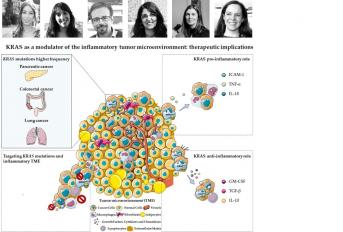Associação Portuguesa de Investigação em Cancro
KRAS as a Modulator of the Inflammatory Tumor Microenvironment
KRAS as a Modulator of the Inflammatory Tumor Microenvironment

Authors and Affiliations:
Flávia Pereira 1,2,3,4, Anabela Ferreira 1,2, Celso Albuquerque Reis 3,5,6, Maria João Sousa 1,2, Maria José Oliveira 3,4,5 and Ana Preto 1,2
1 Centre of Molecular and Environmental Biology (CBMA), Department of Biology, Campus de Gualtar, University of Minho, 4710-057 Braga, Portugal
2 Institute of Science and Innovation for Bio-Sustainability (IB-S), Campus de Gualtar, University of Minho, 4710-057 Braga, Portugal
3 Institute for Research and Innovation in Health (i3S), University of Porto, 4200-135 Porto, Portugal
4 Institute of Biomedical Engineering (INEB), University of Porto, 4200-135 Porto, Portugal
5 Institute of Biomedical Sciences Abel Salazar (ICBAS), University of Porto, 4050-313 Porto, Portugal
6 Institute of Molecular Pathology and Immunology, University of Porto (IPATIMUP), 4200-135 Porto, Portugal
KRAS mutations are one of the most frequent oncogenic mutations of all human cancers, being more prevalent in pancreatic, colorectal, and lung cancers. Intensive efforts have been encouraged in order to understand the effect of KRAS mutations, not only on tumor cells but also on the dynamic network composed by the tumor microenvironment (TME). The relevance of the TME in cancer biology has been increasing due to its impact on the modulation of cancer cell activities, which can dictate the success of tumor progression. Here, we aimed to clarify the pro- and anti-inflammatory role of KRAS mutations over the TME, detailing the context and the signaling pathways involved. In this review, we expect to open new avenues for investigating the potential of KRAS mutations on inflammatory TME modulation, opening a different vision of therapeutic combined approaches to overcome KRAS-associated therapy inefficacy and resistance in cancer.
Cells
https://www.mdpi.com/2073-4409/11/3/398




